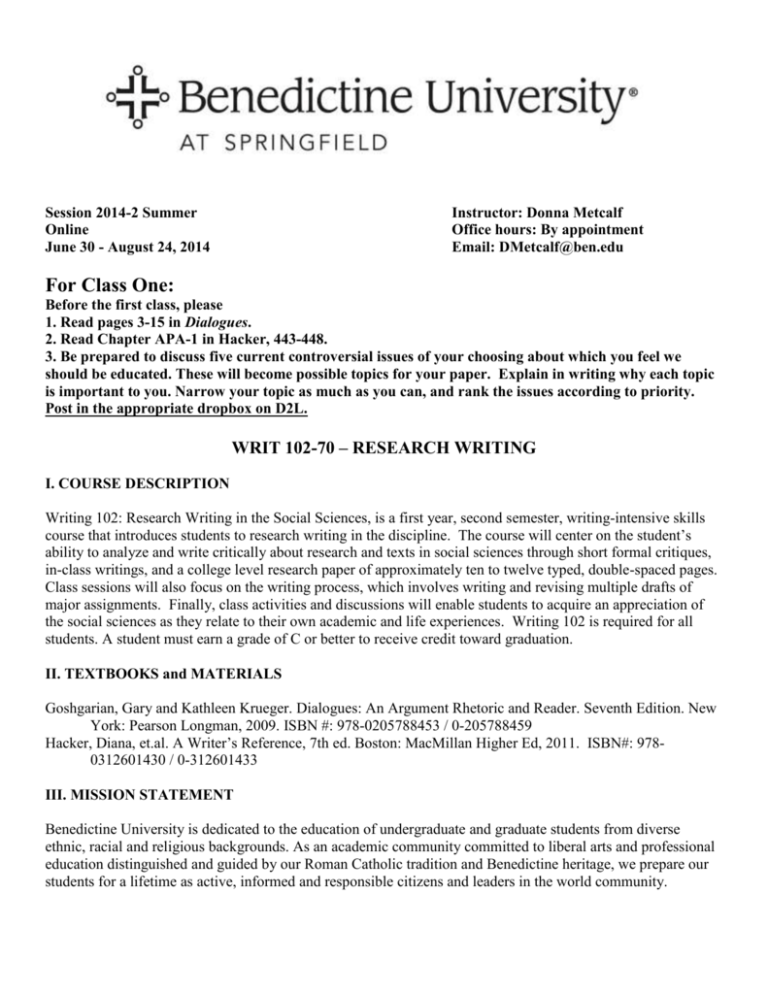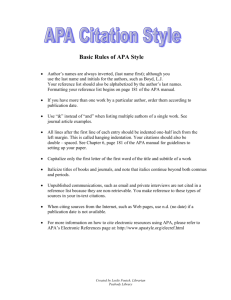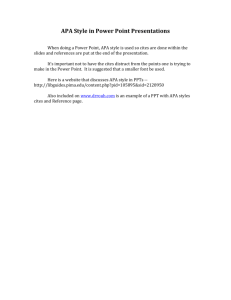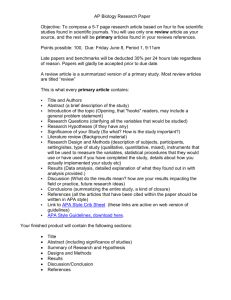
1
Session 2014-2 Summer
Online
June 30 - August 24, 2014
Instructor: Donna Metcalf
Office hours: By appointment
Email: DMetcalf@ben.edu
For Class One:
Before the first class, please
1. Read pages 3-15 in Dialogues.
2. Read Chapter APA-1 in Hacker, 443-448.
3. Be prepared to discuss five current controversial issues of your choosing about which you feel we
should be educated. These will become possible topics for your paper. Explain in writing why each topic
is important to you. Narrow your topic as much as you can, and rank the issues according to priority.
Post in the appropriate dropbox on D2L.
WRIT 102-70 – RESEARCH WRITING
I. COURSE DESCRIPTION
Writing 102: Research Writing in the Social Sciences, is a first year, second semester, writing-intensive skills
course that introduces students to research writing in the discipline. The course will center on the student’s
ability to analyze and write critically about research and texts in social sciences through short formal critiques,
in-class writings, and a college level research paper of approximately ten to twelve typed, double-spaced pages.
Class sessions will also focus on the writing process, which involves writing and revising multiple drafts of
major assignments. Finally, class activities and discussions will enable students to acquire an appreciation of
the social sciences as they relate to their own academic and life experiences. Writing 102 is required for all
students. A student must earn a grade of C or better to receive credit toward graduation.
II. TEXTBOOKS and MATERIALS
Goshgarian, Gary and Kathleen Krueger. Dialogues: An Argument Rhetoric and Reader. Seventh Edition. New
York: Pearson Longman, 2009. ISBN #: 978-0205788453 / 0-205788459
Hacker, Diana, et.al. A Writer’s Reference, 7th ed. Boston: MacMillan Higher Ed, 2011. ISBN#: 9780312601430 / 0-312601433
III. MISSION STATEMENT
Benedictine University is dedicated to the education of undergraduate and graduate students from diverse
ethnic, racial and religious backgrounds. As an academic community committed to liberal arts and professional
education distinguished and guided by our Roman Catholic tradition and Benedictine heritage, we prepare our
students for a lifetime as active, informed and responsible citizens and leaders in the world community.
2
IV. GOALS and STUDENT LEARNING OUTCOMES for WRIT 102
A. Benedictine Core Goals
Benedictine University's core mission is to prepare students for active participation in an increasingly
interconnected world. Its Core Curriculum advances this mission by enabling students to attain a broad range of
learning goals, listed below:
1. Demonstrate an effective level of cognitive, communicative, and research skills;
2. Achieve a college level of computational skills and an ability to understand and interpret numerical
data;
3. Acquire a knowledge of the history and heritage of western civilization, to include
the contributions of religious faith and philosophical thought to understanding the person in
community,
the relationship of the individual to society: membership and participation in groups and
institutions,
scientific literacy through a knowledge of the history, the methods, and the impact of science on
the individual, society, and the environment,
artistic and literary heritage;
4. Develop an understanding of global society: cultural diversity, mutual relationships, interdependence of
peoples and nations;
5. Apply liberal learning in problem-solving contexts as preparation for active participation in society;
6. Make informed ethical decisions that promote personal integrity, the legitimate rights and aspirations of
individuals and groups, and the common good.
B. Course Objectives/Outcomes
As a course within the Core Curriculum, WRIT 102 was designed with the above Core goal in mind. Thus,
upon successful completion of WRIT 102, the student will be able to demonstrate their mastery of the following
objectives and student learning outcomes:
1. Identify and analyze elements of social science writing with a critical eye.
2. Distinguish examples of writing in social sciences.
3. Identify the audience of an essay.
4. Identify and utilize terms, in writing assignments and class discussions, related to the study of the social
sciences.
5. Apply strategies used to appeal to an audience (textual evidence and statistics, for example).
6. Use strategies to improve reading comprehension: students will be expected to summarize articles,
paraphrase passages, and look up unfamiliar terms in paper or on-line dictionaries.
7. Participate, through small and large group written and oral activities, as a productive, engaged member
of a writing community.
8. Use techniques like free writing, brainstorming, and clustering to generate ideas in writing.
9. Demonstrate the development of an idea using the drafting sequence: form an initial topic, write and
rewrite several rough drafts, revise, if applicable, a final draft.
10. Write original, well-developed, and grammatically correct prose in Edited, Standard, Written English
(ESWE). Although the overall quality of writing will be evaluated, essays should not contain more than
a few significant errors per page.
11. Write critical essays with a clear thesis statement that presents an original interpretation or argument that
relies on relevant, specific, textual evidence, not solely on unsupported personal opinion, feelings, or
speculation.
3
12. Apply revision techniques—adding, deleting, substituting, and reordering elements—consistent with
the purpose of the essay; proofread and edit original writing and correct errors in sentence patterning,
word forms, spelling, vocabulary, and mechanics.
13. Locate, evaluate, use, and correctly document basic research materials. Use methods of incorporating
resource information legitimately, distinguishing between common knowledge and researched
information and using current APA documentation guidelines.
V. TEACHING METHODS/DELIVERY SYSTEM
This is an online class, and students will be expected to use D2L for all assignments and participation. The class
will include weekly written assignments, posts on the discussion board, and a final research paper. I am always
available by email, and answer emails quickly.
VI. COURSE REQUIREMENTS
ATTENDANCE: Attendance Policy (for all 5-, 8-, 10-week courses)
This course is highly accelerated, and students will need to take a great deal of responsibility for their own
learning outcomes. Attendance is required in each class meeting for the full period of time. Any absence must
be due to extraordinary circumstances and will require documentation for it to be considered excused.
Documentation must be provided immediately in order to determine what, if any, accommodations are
reasonable or possible. Class attendance will directly impact your final grade, and each undocumented absence
will be considered unexcused and will result in a 20% reduction in the final grade for the course.
Due to the accelerated nature of the course, should you experience a medical condition which prevents you from
attending any class(es), appropriate medical documentation must be provided immediately so it may be
determined what, if any, accommodations are reasonable or possible.
For this online class:
1. Students are expected to visit D2L for course information often (preferably daily) for all announcements and
updates and also to fully understand and complete assignments. Participation in the class is entirely through
D2L. It is also to your advantage to join the class email list by sending me an email as soon as you can.
2. All assignments will be posted on D2L and will need to be submitted using the assignment links. You will
also need to view the plagiarism reports for all posts and papers to ensure that you have no problems with
plagiarism. Post all work early, so you have time to revise, if necessary.
3. Each week, questions about each of the readings will be posted. You will be asked to answer these questions,
read the posts of other students and respond to other students’ answers to questions on the discussion board.
There will be new questions each week, and you must post on time to earn the points each week.
4. All assignments have deadlines. It is the student’s responsibility to pay attention to these dates. No late work
will be accepted. Each week’s work, with the exception of the discussion forums, is due at midnight on Sunday
at the end of each week. Discussion forum posts are due on Wednesdays, with comments on posts made by
others due on Sunday at midnight.
5. Etiquette – Students are expected to exhibit respect and courtesy through any posts or other interactions on
D2L. Failure to do so will result in a loss of points for the assignment.
6. Help with technology: Please use the Resource Center for help with D2L and other technologies used in this
class.
4
WRITTEN ASSIGNMENTS: Because this is a writing course, your grade will be based on writing essays,
using in-text citations and works cited, working in revision groups, editing final drafts, and answering reading
questions. Do all writing assignments by their due dates. No late work will be accepted, except in case of
emergency, and only if you contact me when the work is due.
Type all writing assignments. Double space your essays. Set the computer to do this--do not hit enter at ends of
lines. Leave one-inch margins on all four sides. Use 12 or 13 font size and Times New Roman font or a
comparable one. Let me know if you need to learn how to do any of this formatting. I am happy to help you.
Keep all graded work in a folder for the entire session.
All work will be submitted through D2L, making use of the plagiarism detection software. If you need help with
these technologies, you will find help in the Resource Center.
PEER REVIEW: Students are expected to participate in instructor-guided peer reviews. These are worth 5%
of your final grade.
TECHNOLOGY: We will use Desire2Learn and turnitin.com. Please use your school email address and
check it regularly throughout the course. Also, save all of your work by placing it on D2L, emailing it to
yourself, or using a technology such as dropbox.com.
Benedictine University at Springfield Student Academic Honesty Policy
The search for truth and the dissemination of knowledge are the central missions of a university. Benedictine
University at Springfield pursues these missions in an environment guided by our Roman Catholic tradition and
our Benedictine heritage. Integrity and honesty are therefore expected of all University students. Actions such
as cheating, plagiarism, collusion, fabrication, forgery, falsification, destruction, multiple submission,
solicitation, and misrepresentation are violations of these expectations and constitute unacceptable behavior in
the University community.
Student’s Responsibility
Though there is no formal honor code at Benedictine University at Springfield, students are expected to exhibit
academic honesty at all times. Violations against academic honesty are always serious and may result in
sanctions that could have profound long-term effects. The final responsibility for understanding the Academic
Honesty Policy of the institution, as well as the specific policies for individual courses normally found in
syllabi, rests with students. If any doubt exists about what constitutes academic dishonesty, students have the
responsibility to talk to the faculty member. Students should expect the members of their class to be
academically honest. If students believe one or more members of the class have been deceitful to gain
academic advantage in the class, students should feel comfortable to approach the faculty member of the course
without prejudice.
Violations of the Academic Honesty Policy will be reported to the Office of the Dean of Academic Affairs.
Along with a verbal warning, the following are consequences a student may face for academic dishonesty:
a failing grade or “zero” for the assignment;
dismissal from and a failing grade for the course; or
dismissal from the Institution.
5
VII. MEANS OF EVALUATION
Summary and World’s Shortest Research paper 10%
Five Source Worksheets (APA) 20%
Research Proposal 10% (500 words)
First two pages of draft with documentation 5%
Final APA Paper 30% (2500 words)
Discussion Forums 20%
Peer Review 5%
GRADING SCALE:
A = 100 to 90% B = 89 to 80% C = 79 to 70% D = 69 to 60% F = 59% or below
A student must earn a C or better in WRIT 102 to earn credit toward graduation.
If a student believes that an error has been made in reporting a grade, an appeal must be made in writing to the
instructor and must be initiated within 60 calendar days after the end of the term for which the grade in question
was reported. The appeal should contain specific information about why it is believed the grade reported is
inaccurate. See the Student Handbook for additional details.
Add/Drop Dates
Please refer to the current Academic Calendar for add/drop dates.
Incomplete Request
To qualify for an “I” grade, a minimum of 75% of the course work must be completed with a “C” or better, and
a student must submit a completed “Request for an Incomplete” form to the Registrar’s Office. The form must
be completed by both student and instructor, but it is the student’s responsibility (not the instructor’s) to initiate
this process and obtain the necessary signatures.
Student Withdrawal Procedure
It is the student’s responsibility to officially withdraw from a course by completing the appropriate form, with
appropriate signatures, and returning the completed form to the Advising Office. Please refer to the Student
Handbook for important financial information related to withdrawals.
VIII. TOPICAL COURSE OUTLINE for WRIT 102:
Week One: (June 30)
Assignments due before class:
Before the first class, please
1. Read pages 3-15 in Dialogues.
2. Come up with five current controversial issues of your choosing about which you feel we should be educated.
These will become possible topics for your APA paper. Explain in writing why each topic is important to
you. Narrow your topic as much as you can, and rank the issues according to priority. Post in the
appropriate dropbox on D2L.
3. Read Dialogues: “The Case Against Tipping” 20. Post answers to the discussion forum for Week One and to
Discussion Drop Box 1.
4. Introduce Hacker book. Read Chapter R1, R2, R3. 331-366. Do the online exercises that you find here:
6
http://bcs.bedfordstmartins.com/writersref7e/#612701__621931__
Be sure to log in and enter my email so that you get credit for this assignment. You’ll need to use my
DLM1426@gmail.com email for these assignments. Also, redo any assignment until you score at least
80%.
(Begin with the Exercise Research R1-1.)
Week Two: (July 7)
1. Library instruction: how to use the databases. View these tutorials:
http://libguides.ben.edu/EBSCO
http://libguides.ben.edu/WRIT102Lit
I also encourage you to work with Brian Hickam in the library. Email him at Bhickam@ben.edu to set up an
appointment.
2. Dialogues: Read Chapter 2, 26-37; Chapter 3, 59-68. Read Chapter 5, 113-119, which includes “Indian
Bones,” and 130-133, which includes “Is Anything Private Anymore?” Post answers to the discussion forum for
Week Two and to Discussion Drop Box 2.
3. Have thesis and three subpoints approved. Post to drop box. Begin thesis and research proposal. Begin to
look for articles.
4. Summary assignment 1 is due. Post to drop box. Review the appropriate rubric before you post all
assignments.
Week Three: (July 14) 1. Hacker APA-1, APA-2 and APA-3, 443-458. Read Chapter in Hacker, 443-448.
Follow this link
http://bcs.bedfordstmartins.com/writersref7e/#612701__621933__
and complete these exercises:
APA 1-1 Thesis statements in APA papers
APA 1-2 Thesis statements in APA papers
APA 2-1 Avoiding plagiarism in APA papers
APA 2-2 Avoiding plagiarism in APA papers
APA 2-5 Recognizing common knowledge in APA papers
APA 3-1 Integrating sources in APA papers
APA 3-2 Integrating sources in APA papers
Be sure to log in so that the results are recorded.
2. In Dialogues: Chapter 10: Advertising, read “Which one of these Sneakers is Me” 298, “Branded World”
302 and “The $100 Christmas” 305. Post answers to the discussion forum for Week Three and to Discussion
Drop Box 3.
3. Complete Summary 2 and post to drop box.
4. Work on Research Proposal. (You cannot begin your research until your proposal has been approved.) Post
to drop box.
Week Four: (July 21)
1. Complete World’s Shortest Research Paper and submit to drop box.
2. Begin working on Source Worksheets.
3. Research Proposal due. Post to drop box. You cannot begin your draft until your proposal has been
approved.
7
4. Hacker: APA-4 Documenting Sources 458-483 and APA-5 Manuscript format 483-497. Follow this link
http://bcs.bedfordstmartins.com/writersref7e/#612701__621933__
and complete these exercises:
APA 4-1 APA documentation: in-text citations
APA 4-2 APA documentation: in-text citations
APA 4-4 APA documentation: identifying elements of sources
APA 4-5 APA documentation: reference list
APA 4-6 APA documentation: reference list
APA 4-8 APA documentation
Be sure to log in so that the results are recorded.
Week Five: (July 28):
1. In Dialogues, review sample research paper “Tapped Out,” 283-289.
2. Work on research and Source Worksheets. You should have at least three completed this week.
3. Dialogues: Read Chapter 16: Our Lives Online: “Is Google Making Us Stupid” 558, and “My Facebook,
My Self” 571. Post answers to the discussion forum for Week Five and to Discussion Drop Box 4
(for week 5)
Week Six: (August 4):
1. All Source Worksheets due. You must have one for each of your sources. Post to drop boxes.
2. Have first two pages of draft approved. This draft must include documentation and must be approved
before you complete your paper. Post to drop box.
Week Seven: (August 11)
1. Draft due.
2. Peer Review. You will be assigned a partner and will exchange papers.
Week Eight: (August 18)
1. Complete revisions to final paper.
2. Research Paper Due. Must be posted by noon on Friday, to give you time to review the turnitin.com report
and make revisions as necessary. Final paper is due at midnight Sunday.
3. Final Assessment.
IX. AMERICANS WITH DISABILITIES ACT (ADA)
Benedictine University at Springfield provides individuals with disabilities reasonable accommodations to
participate in educational programs, activities, and services. Students with disabilities requiring
accommodations to participate in campus-sponsored programs, activities, and services, or to meet course
requirements, should contact the Resource Center as early as possible: springaccess@ben.edu or (217) 5251420, ext. 3306.
X. ASSESSMENT
Goals, objectives, and learning outcomes that will be assessed in the class are stated in this syllabus. Instructor
will use background knowledge probes, one-minute papers, reflective essays and/or other Classroom
Assessment Techniques as deemed necessary in order to provide continuous improvement of instruction.




